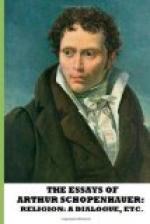The strata of the earth preserve in rows the creatures which lived in former ages; and the array of books on the shelves of a library stores up in like manner the errors of the past and the way in which they have been exposed. Like those creatures, they too were full of life in their time, and made a great deal of noise; but now they are stiff and fossilized, and an object of curiosity to the literary palaeontologist alone.
Herodotus relates that Xerxes wept at the sight of his army, which stretched further than the eye could reach, in the thought that of all these, after a hundred years, not one would be alive. And in looking over a huge catalogue of new books, one might weep at thinking that, when ten years have passed, not one of them will be heard of.
It is in literature as in life: wherever you turn, you stumble at once upon the incorrigible mob of humanity, swarming in all directions, crowding and soiling everything, like flies in summer. Hence the number, which no man can count, of bad books, those rank weeds of literature, which draw nourishment from the corn and choke it. The time, money and attention of the public, which rightfully belong to good books and their noble aims, they take for themselves: they are written for the mere purpose of making money or procuring places. So they are not only useless; they do positive mischief. Nine-tenths of the whole of our present literature has no other aim than to get a few shillings out of the pockets of the public; and to this end author, publisher and reviewer are in league.
Let me mention a crafty and wicked trick, albeit a profitable and successful one, practised by litterateurs, hack writers, and voluminous authors. In complete disregard of good taste and the true culture of the period, they have succeeded in getting the whole of the world of fashion into leading strings, so that they are all trained to read in time, and all the same thing, viz., the newest books; and that for the purpose of getting food for conversation in the circles in which they move. This is the aim served by bad novels, produced by writers who were once celebrated, as Spindler, Bulwer Lytton, Eugene Sue. What can be more miserable than the lot of a reading public like this, always bound to peruse the latest works of extremely commonplace persons who write for money only, and who are therefore never few in number? and for this advantage they are content to know by name only the works of the few superior minds of all ages and all countries. Literary newspapers, too, are a singularly cunning device for robbing the reading public of the time which, if culture is to be attained, should be devoted to the genuine productions of literature, instead of being occupied by the daily bungling commonplace persons.




